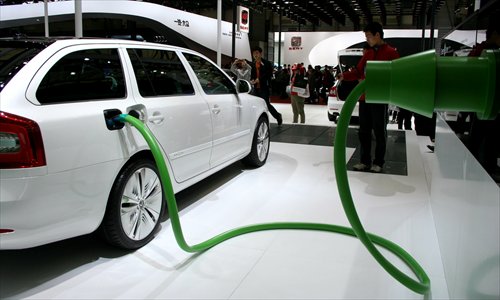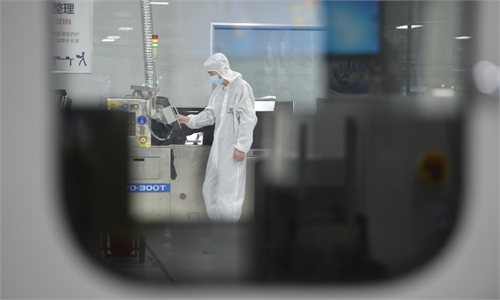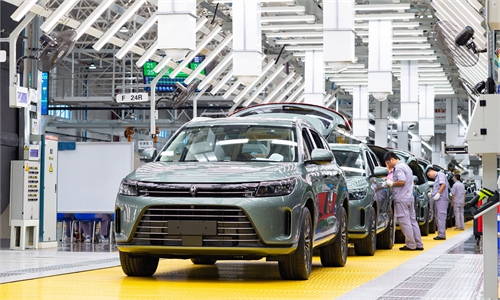
New energy vehicles help improve transport efficiency and control carbon emissions. Photo: CFP
India's reported intention to reduce its dependence on China by exploring other green sources for its new energy vehicle (NEV) sector would mean extra costs, a Chinese industry expert said, adding that it would also hinder the sector's development as India makes the transition toward green energy.
NITI Aayog, a federal think tank chaired by Indian Prime Minister Narendra Modi, is planning to review India's NEV push, since about 75 percent of the country's lithium-ion imports for the batteries to power the cars is from China, the India Times reported on Sunday.
A section within the government feels that India should not rely so heavily on China for lithium-ion and instead explore other green sources to power its future vehicles, the report said, citing an unnamed government official.
But such a move to "decouple" with China would produce little positive outcome and will only hinder India's own development and green transformation, Wang Jingzhong, deputy director general of the China Battery Industry Association, told the Global Times on Monday.
India's total lithium-ion imports surged to $2.31 billion in April 2022-January 2023, up from $1.83 billion in 2021-22. About 75 percent or $1.75 billion of these imports in the first ten months of 2022-23 were from the Chinese mainland, according to media reports.
"China is now the largest manufacturer of NEV batteries and the major player in the whole supply chain. If India wants to develop NEVs as soon as possible, cooperation with China is the best way," Wang said, noting that it is unrealistic to engage in decoupling and go it alone.
The Indian government sees EVs as a shortcut to curbing pollution and reducing its dependence on oil imports. India could slash its oil import bills by around $40 billion by 2030 if electric vehicles were widely adopted, according to a previous proposal by NITI Aayog.
However, the country's changeable and sometimes hostile policies toward foreign companies, such as high tariffs for the sake of protecting local firms, are at odds with the goal of promoting EVs, Wang said, noting that it pushes up production costs and makes it less attractive as a destination for international investors.
In stark contrast, the Chinese government's constant promotion of a new energy transformation with actual policy support for companies in the field has boosted the industry's development.
China's lithium reserves account for around 6 percent of the global total, and up to 80 percent of the raw materials required rely on imports. In order to avoid resource constraints in the latter stages, power battery companies are competing for raw materials by investing in lithium mines.
For example, Chengdu-based Tianqi Lithium has become one of the few companies in the world to gain access to the core resources of the world's highest-quality hard rock lithium mines and lithium salt lakes, and has achieved 100 percent self-sufficiency in lithium concentrates.
Chinese companies play a leading role across the industry, Wang said, which is why it makes sense for India to cooperate with China for a win-win outcome.


